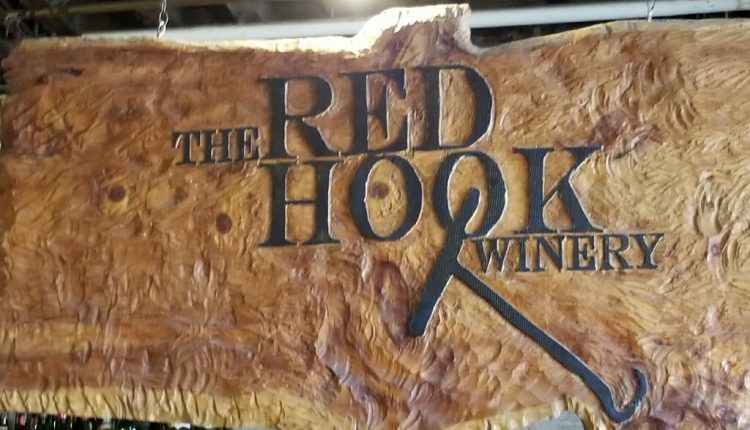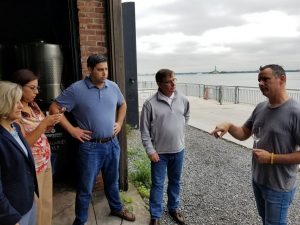
In the Shadow of Lady Liberty
By Adrienne Foster, Region 7 Advocate
On the shores of the Hudson Bay looking out on to the Statute of Liberty sits the Red Hook Winery. On September 14, 2018, the Office of Advocacy was invited to visit the business owned by Mark Snyder in Brooklyn, New York. The Red Hook Winery started in 2008 after Snyder witnessed a huge gap in the local New York wine growing industry – consumers had no outlet focused solely on New York viticulture and promoting all New York producers.

In 2012, the Red Hook Winery was devastated by Hurricane Sandy, suffering a multimillion-dollar loss. As you will see, it would have been much easier to simply close the winery, but Snyder made the decision to reopen it and, also, to encourage other affected businesses to do the same. The disaster tipped off a series of events that have added additional complications to the already complicated task of getting the business back on its feet.
Snyder met the Alcohol and Tobacco Tax and Trade Bureau (TTB.) The impact stymied his efforts.
About one-quarter of the United States population lives in liquor control or government monopoly states. Although New York is not one of those states, they are surrounded by them. These alcoholic beverage control states have state monopoly over the wholesaling or retailing of some or all categories of alcoholic beverages, such as beer, wine and distilled spirits. For example, the neighboring state of Pennsylvania is a beverage control state where all spirits are sold in stores known as “state stores” and overseen by Pennsylvania Liquor Control Board. For those not in a control state, such as New York, their regulatory oversight is performed by both the state and federal governments. In New York, the New York State Liquor Authority enforces these laws.
In June 2017, a federal TTB investigation team notified Snyder that one of his offices had been operating with a Florida state license but did not have a Federal Basic Importer or Wholesaler permit. Additionally, the TTB cited a second problem. They referenced a business practice dealing with certain wine producers fulfilling purchase orders but being paid on a mutually agreed upon monthly basis. While this is a common wine broker model that exists throughout the industry, TTB investigators stated that this might be considered “consignment sales”, a trade practice violation under 27 CFR Part 11.
As the months went on, Snyder became intimately known to both the TTB and the New York State Liquor Authority. Snyder, his employees and his wine producers have all been interrogated, and Snyder was also surveilled. Because Snyder could not provide documentation to the New York Liquor Authority, the TTB confiscated 1,000 cases of wine and over 900 kegs of wine that were produced prior to Hurricane Sandy (the paperwork on these kegs were destroyed after the flooding of Sandy.) The State Liquor Authority characterized that lack of documentation by citing the business as an illegal moonshine operation. Ultimately, he hired a compliance specialist to help with the burdensome regulations and continued site visits.
“The daily impact on my business is immeasurable. It’s ironic that every state is making huge strides to encourage small businesses and small craft beverage operations, and to streamline regulation, licensing and compliance arms of the industry, while the TTB division is trying to go back to 1935 to admittedly enforce outdated rules in conflict to the state initiatives,” said Snyder.
Advocacy was in New Jersey, Pennsylvania, and New York for Regional Regulatory Reform Roundtables September 11-13.
Can’t get to a roundtable near you? Fill out this form and tell us about your federal regulatory burdens. We will pass this information on to the appropriate agency and use it in the planning of upcoming Regional Regulatory Reform Roundtables.
For more information on Advocacy’s mission, our regulatory reform efforts or to find out where the next Regional Regulatory Reform Roundtables will be held, please visit: https://advocacy.sba.gov/regulation/regulatory-reform/.
Adrienne Foster serves as the Region 7 Advocate for the SBA Office of Advocacy, representing small businesses in Iowa, Kansas, Missouri, and Nebraska. Foster works with small business owners, state and local governments, and small business associations to bring the voice of Region 7 to Washington DC. She can be reached at Adrienne.Foster@sba.gov.
